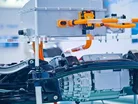Electric vehicles driving cobalt demand up

Demand for cobalt and lithium is continuing to rise, thanks to an ever-expanding electric vehicle market. Cobalt is a key component in lithium-ion batteries, which are widely used in electric and hybrid vehicles.
The world’s lithium-ion battery market is expected to reach $77.42 billion by 2024, according to a report published by Transparency Market Research. The need for smartphones and wearables will also boost the cobalt market.
A Reuters report, highlighting research from CRU Group, predicts that sales of electric vehicles may reach over six million by 2025, a leap from 1.1 million in 2016. Edward Spencer, Senior Consultant of CRU, said:
“In terms of overall demand, EVs only consumed around 6.5 percent of refined cobalt in 2016. This will increase to 16.9 percent in 2021 helping lift demand to nearly 130,000 tonnes. We expect a deficit in the region of 900 tonnes this year. However, a far larger deficit could open quickly if mine and refinery capacity growth fails to keep pace.”
Various cobalt mining companies have reported improvements in exploration programs this year, ensuring their ability to stay competitive as requirements continue to grow and evolve. U.S. Cobalt Inc. and Ecobalt Solutions Inc. in the US, Katanga Mining Ltd. in the Democratic Republic of Congo, and Lundin Mining Corp. in Canada are all steadily contributing to the market.
Panasonic Corp. is a leader in electronic technologies development, and it has signed a deal with Tesla Motors to cooperate on the further construction of the Nevada Gigafactory, which will create thousands of lithium-ion batteries for electric vehicles.
JB Straubel, Chief Technical Officer and Co-Founder of Tesla Motors, said: “The Gigafactory represents a fundamental change in the way large scale battery production can be realised. Not only does the Gigafactory enable capacity needed for the Model 3 but it sets the path for a dramatic reduction in the cost of energy storage across a broad range of applications.”
- ABB: Electrifying Lithium Mining at Nevada's Thacker PassSustainability
- Lithium Demand Surges as EV Growth Pressures Global SupplySustainability
- Can Lithium Mining Keep Up with Soaring Clean Energy Demand?Sustainability
- Codelco & CQM: Chile’s Secret Weapon to Power Electric CarsSustainability



